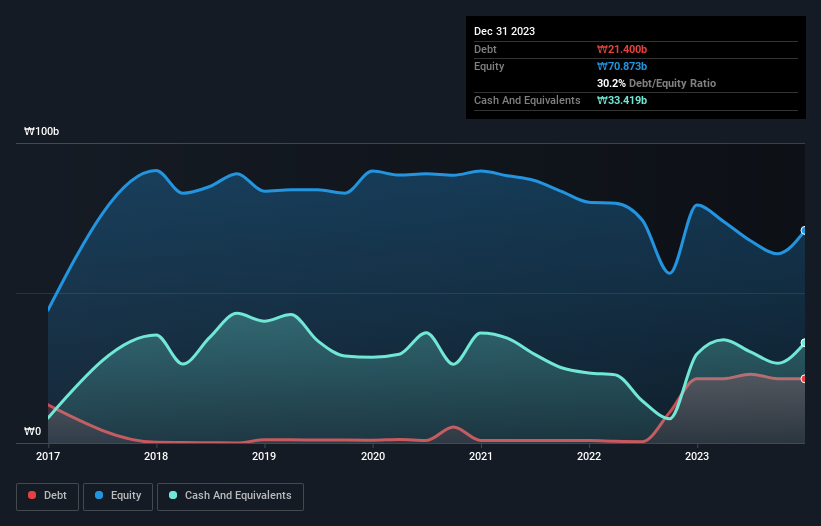- South Korea
- /
- Semiconductors
- /
- KOSDAQ:A171090
Health Check: How Prudently Does SUNIC SYSTEM (KOSDAQ:171090) Use Debt?
David Iben put it well when he said, 'Volatility is not a risk we care about. What we care about is avoiding the permanent loss of capital.' So it might be obvious that you need to consider debt, when you think about how risky any given stock is, because too much debt can sink a company. We note that SUNIC SYSTEM Co., Ltd. (KOSDAQ:171090) does have debt on its balance sheet. But the more important question is: how much risk is that debt creating?
When Is Debt A Problem?
Debt assists a business until the business has trouble paying it off, either with new capital or with free cash flow. In the worst case scenario, a company can go bankrupt if it cannot pay its creditors. However, a more usual (but still expensive) situation is where a company must dilute shareholders at a cheap share price simply to get debt under control. Of course, debt can be an important tool in businesses, particularly capital heavy businesses. The first step when considering a company's debt levels is to consider its cash and debt together.
View our latest analysis for SUNIC SYSTEM
What Is SUNIC SYSTEM's Net Debt?
As you can see below, SUNIC SYSTEM had ₩21.4b of debt, at December 2023, which is about the same as the year before. You can click the chart for greater detail. However, its balance sheet shows it holds ₩33.4b in cash, so it actually has ₩12.0b net cash.

How Strong Is SUNIC SYSTEM's Balance Sheet?
The latest balance sheet data shows that SUNIC SYSTEM had liabilities of ₩60.0b due within a year, and liabilities of ₩3.93b falling due after that. On the other hand, it had cash of ₩33.4b and ₩9.95b worth of receivables due within a year. So it has liabilities totalling ₩20.5b more than its cash and near-term receivables, combined.
Of course, SUNIC SYSTEM has a market capitalization of ₩575.2b, so these liabilities are probably manageable. However, we do think it is worth keeping an eye on its balance sheet strength, as it may change over time. While it does have liabilities worth noting, SUNIC SYSTEM also has more cash than debt, so we're pretty confident it can manage its debt safely. When analysing debt levels, the balance sheet is the obvious place to start. But it is future earnings, more than anything, that will determine SUNIC SYSTEM's ability to maintain a healthy balance sheet going forward. So if you're focused on the future you can check out this free report showing analyst profit forecasts.
In the last year SUNIC SYSTEM had a loss before interest and tax, and actually shrunk its revenue by 16%, to ₩62b. That's not what we would hope to see.
So How Risky Is SUNIC SYSTEM?
Although SUNIC SYSTEM had an earnings before interest and tax (EBIT) loss over the last twelve months, it generated positive free cash flow of ₩3.8b. So taking that on face value, and considering the net cash situation, we don't think that the stock is too risky in the near term. With revenue growth uninspiring, we'd really need to see some positive EBIT before mustering much enthusiasm for this business. There's no doubt that we learn most about debt from the balance sheet. However, not all investment risk resides within the balance sheet - far from it. To that end, you should be aware of the 2 warning signs we've spotted with SUNIC SYSTEM .
At the end of the day, it's often better to focus on companies that are free from net debt. You can access our special list of such companies (all with a track record of profit growth). It's free.
New: Manage All Your Stock Portfolios in One Place
We've created the ultimate portfolio companion for stock investors, and it's free.
• Connect an unlimited number of Portfolios and see your total in one currency
• Be alerted to new Warning Signs or Risks via email or mobile
• Track the Fair Value of your stocks
Have feedback on this article? Concerned about the content? Get in touch with us directly. Alternatively, email editorial-team (at) simplywallst.com.
This article by Simply Wall St is general in nature. We provide commentary based on historical data and analyst forecasts only using an unbiased methodology and our articles are not intended to be financial advice. It does not constitute a recommendation to buy or sell any stock, and does not take account of your objectives, or your financial situation. We aim to bring you long-term focused analysis driven by fundamental data. Note that our analysis may not factor in the latest price-sensitive company announcements or qualitative material. Simply Wall St has no position in any stocks mentioned.
About KOSDAQ:A171090
SUNIC SYSTEM
Manufactures and sells OLED deposition equipment and semiconductor vacuum equipment in Korea.
Undervalued with excellent balance sheet.
Similar Companies
Market Insights
Community Narratives



